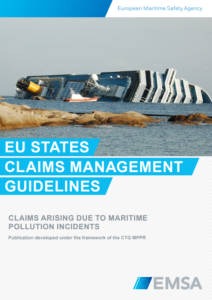EMSA created some guidelines aiming to provide guidance to claims arising because of maritime pollution incidents. The guidelines include a step by step process to handle such incidents, from the first hour until settling the claim.
Every shipping incident is a unique event and has specific elements that may not have been experienced during another incident. National and international legislation remain the same, despite the fact that the applicability of legislation may vary per incident.
For this reason, the guidelines suggest that scenarios are prepared describing the types of incidents and related topics. The process for incident response planning, cost recovery planning and overall review of lessons learned fits into a management tool named ‘The Plan-Do-CheckAct cycle.’
Steps in the process
The Plan-Do-Check-Act cycle philosophy is applicable to Claims Management, because in the process of handling incidents right from the first hour until settling the claim, involves:
- Preparation and planning;
- Applying the prepared methodology;
- Act accordingly in compiling the claim;
- Checking during the settlement meetings if it is necessary to review aspects of the initial Plan.
- Some examples of a typical Plan for pre-incident work is given below, however, this list is not exhaustive:
- Develop a pricing structure for State owned resources and methods of calculation;
- Develop a system of record keeping and a method of ensuring that all responders understand that this is the responsibility of everyone;
- Draft an overview of what costs will be charged, including statements on annual costs for storage and maintenance of equipment;
- Define fees/costs in concurrence with wear and tear of equipment; new for old (replacement cycle);
- Develop personal daily reporting and registration forms;
- Describe the organisation handling the compilation of the file leading towards compiling the claim for cost recovery;
- Develop a strategy with regard to relatively small incidents (small claims) and large-scale accidents (e.g. SEA EMPRESS or PRESTIGE); whether or not to contract-in a service to collate the file and prepare the claim;
- Describe government to government assistance and related cost recovery;
- Define way to deal with legal interest. The claimant and polluter can agree to limit the time period of the legal interest because of the time required to compile the claim. However, the claimant is entitled to have the entire period charged;
- Define type of financial security / guarantee that satisfies the need of your State.
Recording lessons learned
In case of a maritime incident, the National Contingency Plan is tested in actual conditions. Many of its aspects, such as communication schemes, response plans, salvage arrangements are later evaluated, and the findings may lead to a review of existing plans.
A number of incidents, especially those with a large impact, like the ‘Prestige’ have been presented to a wider audience where experts from Member States discussed various aspects of the management of the maritime incident. However, the issue of Claims Management and the procedures used for cost recovery are seldom addressed.
The need for a ‘lessons learned’ session after a claim is also crucial. It is necessary to understand those aspects of the process that raised concern, that were thoroughly debated and that required the highest level of justification. Compilation and presentation of a claim, providing the justification for the expenses and evidence of the reasonableness of specific parts of the claim, as well as the narrative should also be reflected in a lessons learned session.
Lessons learned is not a descriptive presentation of the figures and facts of the response measures, but it is to make Member States’ claims management experts aware of the relevant aspects of a claim that were profoundly disputed in the settlement with the representative of the polluter. Especially those issues that cause consideration for review of these Guidelines on claims management
EMSA explains.
You may see more information in the following report





























































